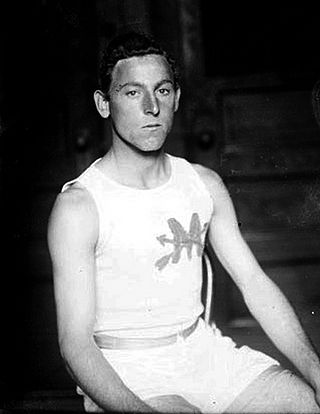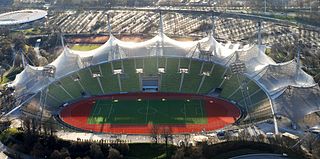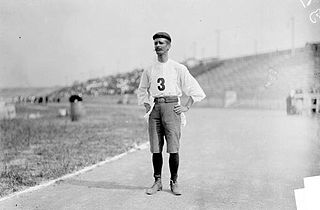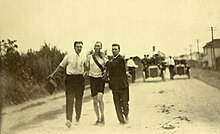
Michel Johann Théato was a Luxembourgish long-distance runner, and the winner of the marathon at the 1900 Olympics in Paris running for France. He was born in Luxembourg City, Luxembourg and died in Paris, France.

Thomas John Hicks was an American track and field athlete. He won the marathon at the Olympic Games in 1904.

The men's marathon event was a special race invented as part of the Athletics at the 1896 Summer Olympics programme. Seventeen athletes from 5 nations competed. It was the capstone of the athletics programme. The event was won by Spyridon Louis and was the only Greek victory in athletics.

Frederick Lorz was an American long distance runner who won the 1905 Boston Marathon. Lorz is also known for his "finish" in the marathon at the 1904 Summer Olympics for not having crossed the "half-way mark" and still winning.

John Joseph Daly was an Irish runner who won a silver medal in the steeplechase at the 1904 Summer Olympics. He competed for Ireland at the International Cross Country Championships of 1903–1906 and won two silver team medals; individually he won a bronze in 1903 and finished fourth in 1904 and 1906. When not competing for Ireland as a member of the Gaelic Athletic Association, Daly entered races as a member of the Irish American Athletic Club.

The men's marathon at the 1904 Summer Olympics in St. Louis, United States, took place on August 30 of that year, over a distance of 24.85 miles (40 km).

The men's marathon at the 1972 Summer Olympics in Munich, West Germany was held on Sunday September 10, 1972. The race started at 15:00h local time. There were 74 competitors from 39 countries. Twelve of them did not finish. The maximum number of athletes per nation had been set at 3 since the 1930 Olympic Congress. The event was won by Frank Shorter of the United States, the nation's first Olympic marathon victory since 1908 and third overall. Karel Lismont won Belgium's second medal in the marathon with his silver. Mamo Wolde of Ethiopia became only the second man, after his countryman Abebe Bikila, to win two medals in the marathon. Ethiopia's four-Games medal streak was matched only by Finland (1920–1932).

Richard Grant was a Canadian track and field athlete who competed at the 1900 Summer Olympics in Paris, France for the United States. He also competed in the first four Boston Marathons, one of only two athletes to have done so.

Félix de la Caridad Carvajal y Soto, known as Andarín Carvajal was a Cuban mailman and long-distance runner who competed in the 1904 Summer Olympics.
Harvey Wright Cohn was an American track and field athlete and a member of the Irish American Athletic Club. A native of New York City, Cohn competed in the 1904 Summer Olympics, the 1906 Intercalated Games in Athens and 1908 Summer Olympics in London.
Jack Strangl Bacheler is an American former long-distance runner and two-time U.S. Olympian. Born in Washington, District of Columbia, Bacheler was a founding member of the Florida Track Club at Gainesville, Florida in the late 1960s, and personally designed the club's distinctive "orange" logo. Standing 6 feet 7 inches, yet weighing only 165 pounds, he towered over most of his competitors. Now living in Clayton, North Carolina, he is married to Patricia Bacheler. Bacheler has two children, daughter Teresa (Teri), and son Matthew (Matt).
Robert Arthur Fowler was a Newfoundland-born long-distance runner who was recognized by the International Association of Athletics Federations as having set a world's best in the marathon on January 1, 1909 with a time of 2:52:45.4 at the Empire City Marathon in Yonkers, New York.
Samuel Alexander Mellor Jr. was an American long-distance runner who won the 1902 Boston Marathon and competed in the marathon at the 1904 Summer Olympics in St. Louis, Missouri.

George Bernard Blake was an Australian sportsman who competed in the 1906 Intercalated Games and 1908 Summer Olympics as a long distance runner. He also played Australian rules football with St Kilda and Carlton in the Victorian Football League (VFL).
John Charles Lordan (or Lorden) (born June 30, 1874, or June 29, 1876, died February 12, 1960) was an American long-distance runner who won the 1903 Boston Marathon and competed in the marathon at the 1904 Summer Olympics in St. Louis, Missouri.
Umberto Blasi was an Italian long-distance runner who was a three-time national champion in the marathon and competed in the men's marathon at the 1908 Summer Olympics.
Ralph Williams was an American long-distance runner. He competed in the marathon at the 1924 Summer Olympics. He made it on the US Olympic Team after finishing 7th in the Boston Marathon on April 19, 1924, with a time of 2:41:58.6. The Boston Marathon was later measured and found to be 152 meters short.
Marathon course-cutting occurs when runners complete less than an entire course of a marathon before going over the finish line. The standard length of a marathon course is 42.195 kilometers, about 26.2 miles. Course-cutting may be intentional or unintentional and can be achieved by various means: when done intentionally, course-cutting constitutes cheating.
Apolinario "Polin" Belisle Gómez is a former marathon runner. He represented Belize at the 1988 Olympic Games and was scheduled to represent Honduras at the 1992 Olympic Games, before being removed from the team, although he nevertheless took part in the marathon event.
Seth Landqvist was a Swedish long-distance runner. He competed in the men's marathon at the 1908 Summer Olympics, but failed to finish. He also competed in the men's five miles, finishing ninth.












